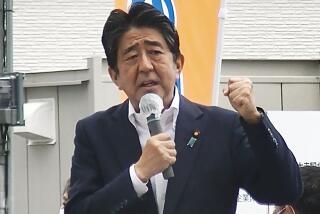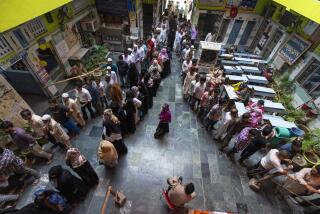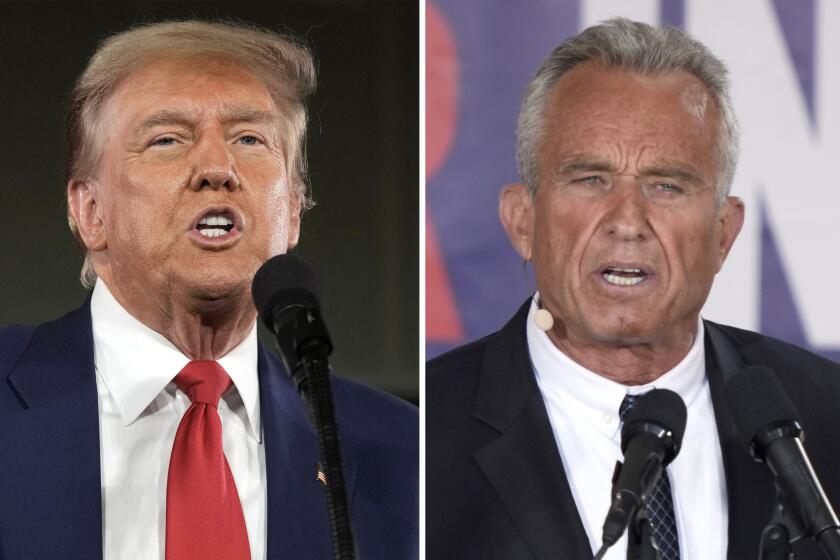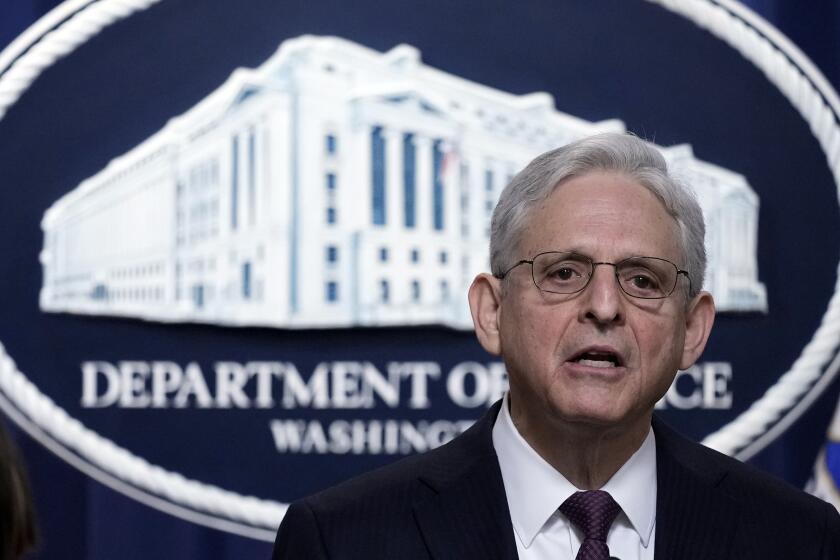Debacle in Chad Causes Kadafi’s Worst Crisis : Year After U.S. Raid, Africa War Takes Toll
One year after the American bombing of Libya, Col. Moammar Kadafi faces what Arab and Western analysts consider the most serious internal crisis of his long, mercurial reign as ruler of the Libyan state.
These analysts said they doubt that opposition to Kadafi is serious enough to overthrow him. But they added that his opponents are expected to preoccupy him for some time and perhaps even have the same depressant effect on Libyan-sponsored terrorism that the U.S. attack had for a brief period.
Citing irrefutable proof of Kadafi’s sponsorship, President Reagan ordered the air raid a year ago this Wednesday, in retaliation for the April 5, 1986, terrorist bombing of a discotheque in West Berlin frequented by U.S. servicemen. The raid, launched from two air bases in Britain and U.S. aircraft carriers in the Mediterranean, was aimed at military targets in Tripoli, the capital, and in Benghazi.
One of the targets was the barracks in Tripoli where Kadafi made his home and headquarters. The bombings, in the early morning hours of April 15, killed Kadafi’s 2-year-old adopted daughter and injured two of his sons. Civilian buildings also were hit, and an unknown number of civilians were killed or injured.
“The U.S. bombing briefly inhibited Libyan terrorist activity,” a senior Egyptian intelligence source said recently. “But otherwise it had no effect. In fact, it even helped Kadafi internally by rallying people around him against an external threat.
“Today, however, the situation is completely different. (Kadafi) can no longer control the situation. More and more, Kadafi is looking like a man alone in his own country.”
The reasons for the leader’s current distress have little to do with the U.S. raid or with any attempts by the United States to destabilize his regime, sources who follow developments in Libya said.
Rather, the sources said, it has been an event mostly of Kadafi’s own doing that could well prove to be his undoing: the mounting cost in men, materiel and morale of Libya’s military intervention in neighboring Chad.
‘Far More Serious’
“The U.S. bombing, in terms of its political consequences, had a very short life,” a Western diplomat said. “But the debacle in Chad is far more serious for Kadafi. Already we are seeing signs of its effects on internal events in Libya.”
Since 1973, Kadafi has been supporting one faction or another in civil war that has been under way in Chad for more than 20 years. That year, Libya annexed the Aozou Strip, a contested ribbon of land believed to be rich in uranium, which runs the length of the Chadian-Libyan border. But real discontent with Libya’s role in the war began emerging only late last year, after Goukouni Oueddei, the rebel leader supported by Kadafi’s troops, switched sides and aligned himself with Chadian President Hissen Habre.
Goukouni’s defection was the first in a series of Libyan setbacks in Chad that have made the war increasingly unpopular at home and fanned discontent within the Libyan armed forces, diplomats and other analysts said.
With Goukouni gone, the Libyans lost control of the Tibesti Mountains between the border and their large air base at Ouadi Doum in Chad. More significant, what had been a civil war with Libyan involvement has become a purely Chadian-Libyan conflict.
“Goukouni’s defection blew Kadafi’s cover in Chad,” a senior Egyptian military source said. “With no Chadians on their side, Libyans began to wonder what they were doing there.”
‘Great Ambitions’
That should have been the time for Kadafi to bow out of Chad, the source added. “But he had great ambitions,” the source said. “He wanted to create an axis from Libya through Chad and Sudan to Ethiopia, in order to isolate Egypt from Africa.”
Against what was believed to be the advice of some of his senior commanders, Kadafi in January began increasing Libya’s presence in northern Chad from about 5,000 to 14,000 troops. According to Egyptian sources, many of those troops were hastily mustered university students who received only 15 days of training before being shipped off to the front.
There, an Egyptian intelligence source said, “they came face to face with reality in the form of hot deserts, food shortages, bad logistics and a more motivated enemy shooting at them.”
With financial, logistical and intelligence support from France, the United States and--to a lesser extent, Egypt--the Chadians began scoring a string of spectacular victories, capturing the heavily defended air base at Ouadi Doum and forcing the Libyans into a general retreat north toward the Aozou Strip.
Figures from Chad, as well as those provided by Egyptian military officials and other sources, estimate Libyan losses at more than 3,600 killed plus 14 planes, nearly 150 tanks and 500 other vehicles captured or destroyed.
“It is unbelievable,” a senior Egyptian military official said. “The amount of weapons the Libyans left behind is enough for the Chadians to establish a complete mechanized division. For Kadafi, it is a disaster, a real disaster.”
Weakened Position Seen
While figuring out what goes on in Libya is an almost impossible task, even for diplomats based there, Egyptian and Western officials say there is ample reason to believe that Kadafi’s internal position has been considerably weakened by the Chad defeat.
“Kadafi has always been careful to hide the war from Libyans,” a Western diplomat said, adding that the military resorts to such subterfuges as sending casualties back to hospitals far from their homes.
But for a country with a population as small as Libya’s--3.5 million--the “magnitude of the casualties over the past few months has been too great to conceal,” the diplomat said. “People are starting to realize what’s going on.”
“Everyone in Libya knows what’s happening in Chad, because every family has a relative there,” an Egyptian military official said. “What will Kadafi tell them? What will he tell his military commanders to explain why he has lost so many of their weapons? And what will he tell the Russians, from whom he got the weapons? This is indeed a big failure for him.”
Although the U.S. attacks are not something that one would expect Libya to celebrate, the need to divert people’s attention from the misadventure in Chad may be behind Libya’s plans to commemorate the raid anniversary with an international “peace conference” in Tripoli, diplomats said.
The Libyan news agency Jana announced the conference last week, saying that more than 2,000 people, including 200 Muslims from the United States, will take part in the four-day affair beginning today.
The Reagan Administration last year banned Americans from traveling to Libya and made it a felony, punishable by up to 10 years in prison, to do so.
Jana said the U.S. delegation to the peace conference will be led by Abdul Akbar Mohammed, whom it identified as the vice president of the “Muslims Movement in America.”
Signs of Discontent
There have been signs of dissatisfaction in Libya lately, although it is hard to know to what extent they may have been caused by events in Chad or have merely coincided with them.
During the last several months, Kadafi has transferred a number of senior military commanders to remote posts; packed his key No. 2 man, Maj. Abdel-Salam Jalloud, off to Syria for an embarrassingly long visit; reshuffled his government, and permitted the execution of several opponents to be shown on live television, evidently as a warning to others.
The decentralization of the Libyan government, begun after the U.S. bombing, has accelerated over the last few months. Kadafi has scattered key elements of the civilian bureaucracy, revolutionary command structure and the professional military to desert sites far from Tripoli. This reportedly has added to the discontent but seems consistent with Kadafi’s so far successful strategy of divide and rule.
“The more threatened Kadafi feels,” a Western observer said, “the more he divides.”
Officers Defect
The effect of the Chad defeat on the 76,000-member armed forces is perhaps hardest of all to gauge. But one indication of discontent was the defection of two lieutenant colonels and several other officers and enlisted men, who flew to Egypt from Chad aboard military aircraft in two separate incidents last month. In Libya, where the head of the armed forces is a brigadier general and Kadafi himself is only a colonel, the rank of lieutenant colonel is a very senior one.
The defectors, according to Egyptian intelligence sources, told their debriefers that Libyan soldiers in Chad were in disarray and demoralized by the fact that they had not been paid in several months.
The belief that the Libyan armed forces might yet be galvanized into overthrowing Kadafi lay behind last year’s U.S. campaign to destabilize his regime. From the attempt by U.S. forces to provoke a confrontation with Kadafi in the Gulf of Sidra to the “disinformation” campaign that the Administration conducted last summer to try to make Kadafi believe there was a high degree of internal opposition to his rule within Libya, the United States repeatedly sought to catalyze the conditions under which the Libyan leader would either be assassinated or ousted in a military coup, U.S. officials have conceded.
However, Egyptian officials and Western diplomats said then--and still say now--that this strategy was self-defeating and seriously flawed on several counts.
Aware of Threat
They note that Kadafi has long been aware of the potential threat to his regime posed by the military and has, during his 17 years in power, taken a series of effective steps to neutralize it. A pervasive and multilayered security system ferrets out and disposes of potential troublemakers before they can act. And while the professional military may look powerful on paper, Kadafi’s loyal Revolutionary Guards have kept the army’s ammunition under lock and key ever since a 1984 coup attempt.
Despite the heightened disaffection and Kadafi’s weakened position, “expecting the military to overthrow him is wishful thinking,” an Egyptian military source said. “In my view, it is still impossible.”
Nor would killing Kadafi necessarily solve what the United States considers the problem of Libyan support of terrorism, this and other officials said.
“The main problem with Libya now is not Kadafi,” an Egyptian official said. “It is the system he has created over the past 17 years. It is the generation educated by him and grown to maturity under his influence. It is the revolutionary committees and what they represent.
“This system has a stake in perpetuating itself. If you kill Kadafi, you will not make it go away. You will only create more chaos.”
The official reiterated the Egyptian view that the best strategy for dealing with Kadafi is to wait for him to trip himself up.
“Left to his own devices, Kadafi will eventually do himself more harm than you Americans can,” the official said.
More to Read
Start your day right
Sign up for Essential California for news, features and recommendations from the L.A. Times and beyond in your inbox six days a week.
You may occasionally receive promotional content from the Los Angeles Times.






